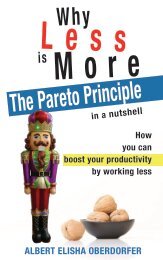POWER PRINCIPLES - ALBERT ELISHA OBERDORFER
Power principles are a kind of unwritten law. They are universal truths. They are what the law of gravity is in the realm of physics. Modern aviation is built on identifying aerodynamic principles and then applying those principles in the design and use of airplanes. They work for everyone. At all times. It is the same with those power principles. Once we learn to work with these principles, we will see their powerful effects. Get ready to learn about and then apply powerful principles such as: - THE POWER OF FOCUS, - THE POWER OF WHY, - THE POWER OF A MISSION STATEMENT, - THE POWER OF AN ACTION PLAN, - THE POWER OF A DEADLINE, - THE POWER OF A CHECKLIST, - THE POWER OF THE PARETO PRINCIPLE, - THE POWER OF IMMEDIATE ACTION, - THE POWER OF A COMPLETED TASK, - THE POWER OF REPETITION, etc. and - THE POWER OF LOVE.
Power principles are a kind of unwritten law.
They are universal truths.
They are what the law of gravity is in the realm of physics.
Modern aviation is built on identifying aerodynamic principles and then applying those principles in the design and use of airplanes.
They work for everyone.
At all times.
It is the same with those power principles.
Once we learn to work with these principles, we will see their powerful effects.
Get ready to learn about and then apply powerful principles such as:
- THE POWER OF FOCUS,
- THE POWER OF WHY,
- THE POWER OF A MISSION STATEMENT,
- THE POWER OF AN ACTION PLAN,
- THE POWER OF A DEADLINE,
- THE POWER OF A CHECKLIST,
- THE POWER OF THE PARETO PRINCIPLE,
- THE POWER OF IMMEDIATE ACTION,
- THE POWER OF A COMPLETED TASK,
- THE POWER OF REPETITION, etc. and
- THE POWER OF LOVE.
Create successful ePaper yourself
Turn your PDF publications into a flip-book with our unique Google optimized e-Paper software.
7 THE <strong>POWER</strong> OF THE<br />
PARETO PRINCIPLE.<br />
WILFREDO PARETO was an Italian<br />
economist who discovered what appears<br />
to be a pervasive principle that operates<br />
in all areas of life.<br />
It is the law of the vital few versus the<br />
trivial many.<br />
It is also called the 80/20 principle.<br />
In business, for example, 20 percent of<br />
customers generate 80 percent of the<br />
revenue.<br />
Twenty percent of criminals commit 80<br />
percent of the crimes.<br />
Twenty percent of drivers cause 80<br />
percent of all traffic accidents.<br />
Twenty percent of employees are<br />
responsible for 80 percent of the results.<br />
And so on.<br />
What this means is that before we are<br />
doing a task, or when we come up with<br />
our task list, we should be thinking ‘what<br />
are the most important tasks.’<br />
33

















